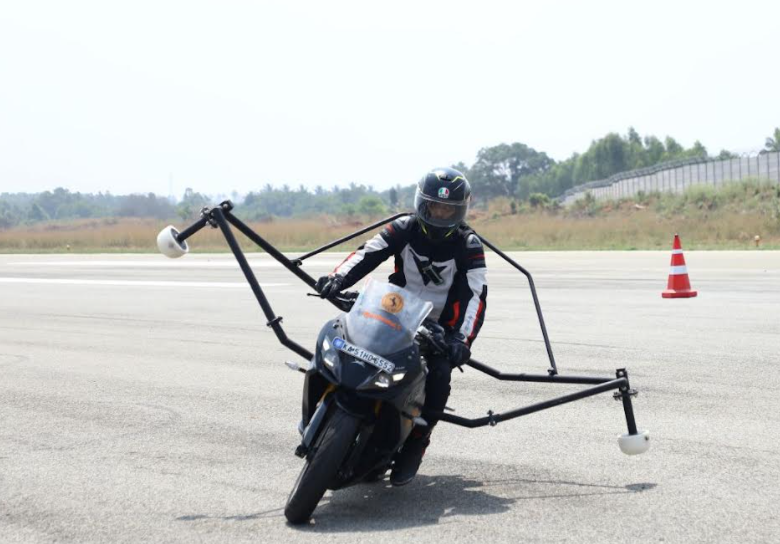
New Delhi:
From 70 engineers ten years ago, to over 6,000 now, the growth of Continental’s India Technical Centre is an indication of the growing technology canvas engineers inside the hub are busy working on. A growing focus segment for the technology creators is two-wheelers. Key among the two-wheeler technologies being worked upon in Bengaluru is the ABS (Anti-lock braking system) technology.ABS is part of the suite of electronic braking/stability technologies that the India engineering team leads globally for the Tier 1 major. “We are now 100% responsible for all the releases, which happen in the region including Japan, Korea, and China,” Prashanth Doreswamy, President & CEO, Continental India, said.
Of the newly-developed wares, the OCB (optimised curve braking) feature is the most advanced for safer riding through enhanced stability using the ABS (Anti-lock braking system) unit. The feature helps riders apply brakes efficiently in curves or turns where there is a high tendency of vehicle slippage due to the wheels locking up. ABS first reads the motorcycle’s status, using lean angle information from the sensor box, and depending on the incline position, intervenes in varying degrees to enable better braking and steering.
The stability enhancing feature is new in the Indian motorcycle market. Currently offered by KTM and Honda, sourced from another Tier 1, the cumulative volume of the models with the feature is estimated to be only 50,000 units annually. Unlike the base ABS technology, which has proliferated thanks to the regulation making it mandatory 3 years ago, a feature like the OCB will be driven by OEMs offering it as a differentiating feature, which also may help in improving profitability of the motorcycles offering it. Continental’s OCB is expected to make a market debut with models from three major OEMs next year, and that could also help the technology’s market adoption rate.
OCB is only one of the ARAS (Advanced Rider Assistance Systems) features based on the ABS system Continental plans to launch in the Indian market. “ABS is like a McDonald’s vanilla ice cream. You can put toppings over it,” Krishan Kohli, MD, Continental Automotive Brake Systems. said. ‘Deflation Detection System Plus’ is another “topping” that Continental plans to offer ifor two-wheelers. ‘DDS+’ is a cost optimised feature that helps in detecting tyre pressure loss by using wheel speed sensor signal, with no additional needs for sensors. The feature is offered by only collecting data from the wheel speed sensor and informing the rider through an indicator on the speedometer console. Multiple riding modes and traction control are a couple of other advanced features based on the ABS unit that are gradually riding into the market.
Following the growing ADAS (Advanced Driver Assistance System), Continental wants to leverage the technologies developed for four-wheelers, and adapt some of them for two-wheeler applications too. Using radar technology, it has developed the Blind Spot Detection (BSD) feature that monitors blind spots for the rider on the adjacent lanes with a radar sensor and can provide visual warnings to the rider in case of any approaching vehicles. A Lane Change Assist (LCA) feature can also be added, warning the rider against a lane change in case there is a risk of a collision due to a vehicle approaching it at a higher relative speed.
Over 2,000 engineers, a third of Continental India’s technical centre’s manpower strength, are working on ADAS/ARAS technologies for the Indian and global markets. Jaidev Venkatraman, R&D head at Continental India’s ADAS business unit, said, “A lot of products are digitalised in nature, so everything is happening through software, and a lot of innovative solutions. India is one of the power houses, so it has moved forward. In terms of component development, and radar development especially, we are strong to run end-to-end projects and take leadership (in Continental’s global network).”
As the automotive landscape gets more disruptive, competitive, and the vehicle highly software-driven, India gains more prominence in Continental’s overall scheme of things. Both as an engineering and R&D base, and as a market. ETAuto learns that the German major is set to make some fresh rounds of investments within the next couple of years. The most immediate one is in a surface solutions plant near Pune which has been set up with substantial investment. The plant has the capacity to manufacture 5 million square metres annually.
Like the two-wheeler ABS regulation, an expected order making ESC (Electronic Stability Control) mandatory in cars will be another driver for technology adoption in the Indian market. And component suppliers offering advanced and cost-efficient solutions will be major gainers. Both Indian and global majors can’t afford to miss such an opportunity.
Also Read:















